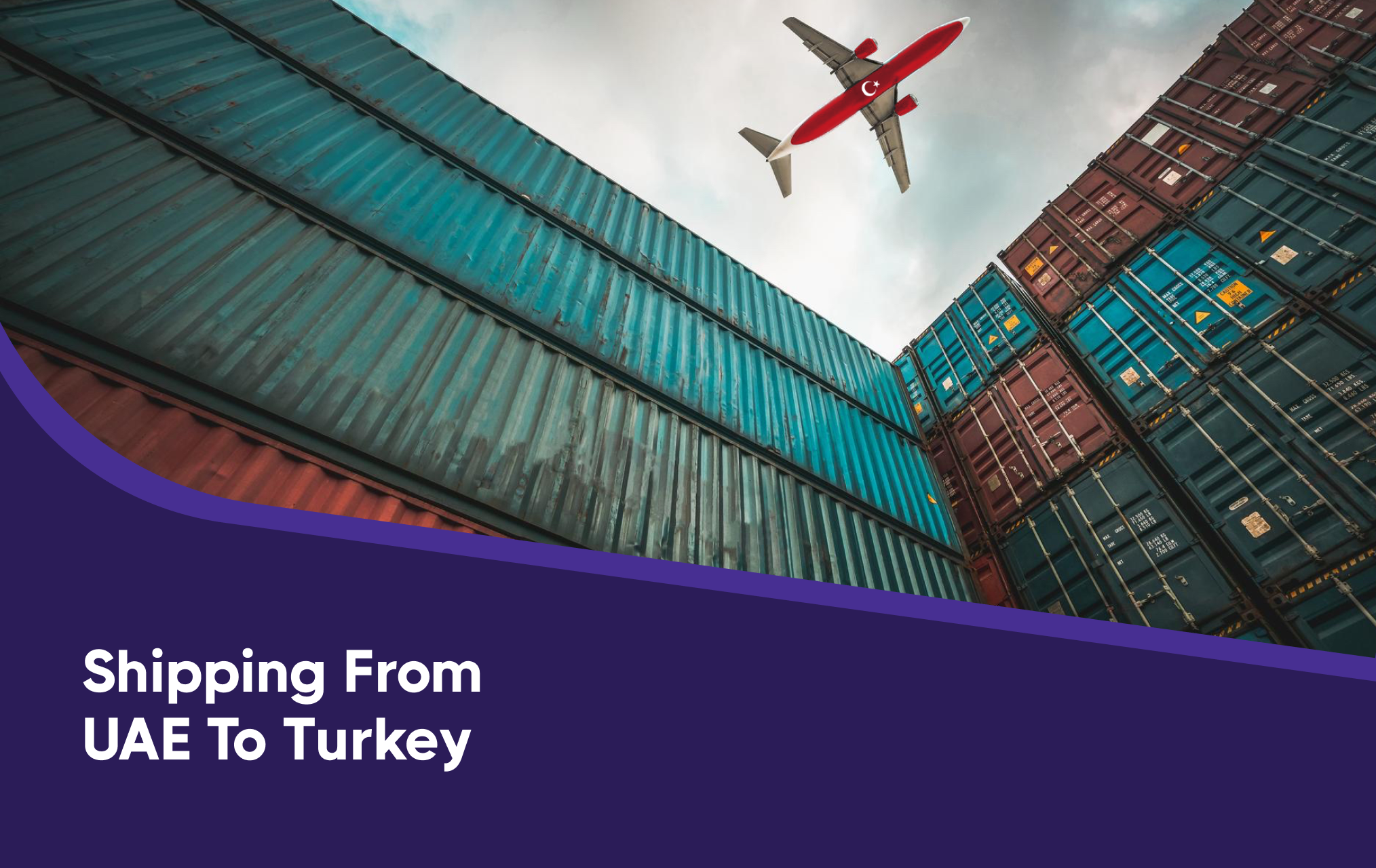When you think about Shipping from UAE to Turkey, it might seem like a complex process filled with paperwork, regulations, and logistics hurdles. But fear not! Whether you’re a seasoned business owner or new to the world of international shipping, this step-by-step guide will walk you through everything you need to know about UAE to Turkey shipping. With Turkey’s booming economy and strategic location, this shipping guide will help you tap into one of the most lucrative markets in the world.
Choose the Right Shipping Service
The first step in your shipping journey is selecting the appropriate shipping service. When considering options, think about the size, weight, and type of your shipment, as well as how quickly it needs to arrive in Turkey.
For time-sensitive shipments, air freight is often the best choice. Turkey's well-established air cargo infrastructure, with international airports like Istanbul and Ankara, connects the country to global markets. This allows for rapid, reliable delivery of high-value goods, perishables, or urgent orders. Air freight ensures that your products reach Turkey in as little as 3-5 days, making it an ideal option for businesses needing fast turnaround times.
If you’re shipping bulkier items or can afford a longer transit time, sea freight may be more economical. Turkey's extensive coastline, with major ports like Istanbul, Izmir, and Mersin, offers excellent connectivity for sea freight. This method is particularly cost-effective for large shipments, with options like Full Container Load (FCL) and Less-than-Container Load (LCL) to suit different volumes. Although sea freight can take several weeks, it provides significant cost savings, especially for businesses that regularly ship large quantities of goods.
Choosing the right service not only impacts your delivery schedule but also your overall shipping costs. Working with a logistics provider who understands the nuances of UAE to Turkey shipping can help you select the most efficient and cost-effective option for your specific needs.
Prepare the Necessary Documentation
Proper documentation is the cornerstone of successful international shipping. When Shipping from UAE to Turkey, you need to ensure that all paperwork is accurate and complete to avoid delays at customs.
The essential documents include:
- Commercial Invoice: This is the bill for the goods being shipped. It should include details like the buyer and seller’s information, a description of the goods, their value, and the terms of sale.
- Packing List: This document lists the contents of each package in your shipment, including dimensions, weight, and how items are packed. It helps customs officials quickly verify the contents of your shipment.
- Certificate of Origin: This certifies where the goods were manufactured and is often required by customs authorities to determine tariffs and duties.
- Bill of Lading (for sea freight) or Airway Bill (for air freight): These documents serve as a contract between the shipper and the carrier and act as a receipt for the goods.
In addition to these standard documents, depending on the type of goods you're shipping, you may also need special permits or licenses. For instance, if you’re shipping food products, health certificates might be required. Ensuring that all documentation is accurate and complies with Turkish import regulations can prevent costly delays and penalties at the border.
Understand Customs Clearance Procedures
Navigating customs clearance is one of the most critical steps in international shipping. Turkey, with its strategic position as a bridge between Europe, Asia, and the Middle East, has specific customs regulations that you must follow to ensure a smooth shipping process.
Before shipping, familiarize yourself with Turkish import regulations. Turkey imposes import restrictions on certain goods to protect national security, public health, and the environment. Items such as firearms, certain chemicals, hazardous materials, and some agricultural products are subject to strict regulations or bans. It’s crucial to verify whether your goods fall under these categories and to secure the necessary permits if required.
Customs duties and taxes in Turkey are calculated based on the value of the goods, which includes the cost of the goods, shipping, and insurance. Turkey also imposes a Value-Added Tax (VAT) on most imported goods, which can vary depending on the product type. Ensuring that you accurately declare the value of your goods and pay the appropriate duties is essential to avoid complications.
Hiring a customs broker can be a valuable investment, as they are experts in navigating the complexities of customs clearance. They can handle the submission of all required documents, payment of duties, and any inspections that may be required, ensuring your shipment clears customs quickly and without issue.
Calculate Shipping Time and Costs
Understanding both the shipping time and the costs involved is crucial for planning and budgeting your shipments effectively. Shipping time from the UAE to Turkey varies based on the method you choose.
- Air Freight: As mentioned earlier, air freight is the fastest option, typically taking 3-5 days. However, it’s also the more expensive choice, making it suitable for high-value or urgent goods.
- Sea Freight: Sea freight, on the other hand, is much more cost-effective, especially for large shipments. Transit times can range from 2-4 weeks depending on the departure and arrival ports, weather conditions, and any stops along the way.
Several factors influence the cost of Shipping from UAE to Turkey, including:
- Weight and Volume: Heavier and bulkier shipments cost more. Sea freight is often calculated based on volume, while air freight is usually based on weight.
- Type of Goods: Some goods may require special handling, packaging, or storage, which can increase costs.
- Insurance: Insuring your shipment is highly recommended, particularly for valuable goods. The cost of insurance depends on the value of the goods and the level of coverage you choose.
- Customs Duties and Taxes: As discussed, customs duties and VAT are significant costs to consider. Accurately estimating these costs upfront can prevent unexpected expenses.
By comparing quotes from different logistics providers and understanding the full scope of costs, you can choose a shipping method that fits both your timeline and budget. Many logistics companies offer cost calculators or consultative services to help you estimate these expenses accurately.
Track Your Shipment
Tracking your shipment is crucial for maintaining control over your supply chain and ensuring that your goods arrive on time. Most international shipping services provide tracking numbers that allow you to monitor the progress of your shipment in real-time.
For air freight, tracking is usually straightforward and highly accurate, given the shorter transit times and fewer handling points. You can often get up-to-the-minute updates on your shipment’s location and status.
Sea freight tracking is also available, though it can be less precise due to the longer transit times and multiple stops along the route. However, knowing where your shipment is at all times helps you anticipate any potential delays and communicate effectively with your customers or partners in Turkey.
Tracking also plays a vital role in managing customer expectations. In today’s fast-paced market, customers value transparency and want to know when their goods will arrive. Providing regular updates on the status of their shipment can enhance your customer service and build trust.
Conclusion
Shipping from UAE to Turkey offers immense opportunities for businesses looking to expand their reach into a thriving and strategically located market. By carefully choosing the right shipping service, preparing all necessary documentation, understanding customs procedures, accurately calculating costs and time, and diligently tracking your shipment, you can ensure a successful and smooth shipping experience.
At eShipper, we specialize in making your international shipping experience seamless. Our expert team is here to assist you every step of the way, from documentation to customs clearance, ensuring your goods reach Turkey with ease. Contact us today to learn more about how we can simplify your shipping processes and help you tap into the growing Turkish market!




